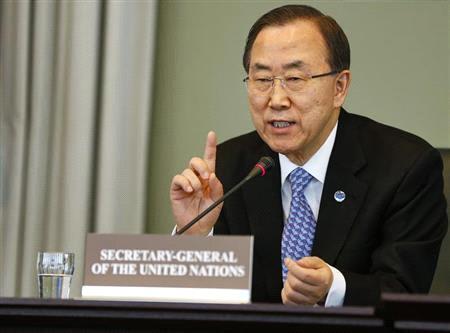Ammon News - UNITED NATIONS (Reuters) - U.N. Secretary-General Ban Ki-moon appealed on Monday for forces loyal to Syrian President Bashar al-Assad and rebel fighters in Syria to put down their weapons during the Muslim holy month of Ramadan.
In a statement, Ban said Ramadan is one of the four months on the Islamic calendar during which fighting is supposed to cease.
"For the sake of the Syrian people, therefore, I would like to call on all parties in Syria to respect this religious obligation for at least, at a minimum, one month," Ban said on the eve of Ramadan, which begins on Tuesday.
"I am calling for every military unit of the regular army and the Free Syrian Army, for every person holding a gun, to stop fighting and offer this month of peace as a collective present to their people - and to do so across Syria," he said.
For more than two years, Assad's forces and rebels determined to oust him have been locked in a conflict that has escalated into an increasingly sectarian civil war. The United Nations estimates that at least 90,000 people have died since the uprising began in March 2011.
The new president of the opposition Syrian National Coalition, Ahmad Jarba, said on Sunday he was prepared to offer Assad's forces a truce during the Muslim holy month.
"I am aware that some may see this call as unrealistic," Ban said. "Lasting peace will only come through serious negotiation. But I am convinced that the Syrian people have every right to ask this of all those who claim to be fighting in their name."
Ban also called for the release of detainees by the government and opposition forces.
"Reliable reports speak of hundreds, if not thousands, of women and children who are detained in various official and non-official detention centers across the country," Ban said. "Armed opposition groups also have many detained people who are not prisoners of war."
Russia and the United States have been trying since May to organize a peace conference involving representatives of the Syrian government and the rebels, but disagreements over issues such as who should participate and a reluctance by both sides have left the Russian-American plan looking increasingly unrealistic, U.N. diplomats say.
